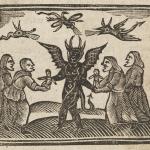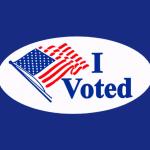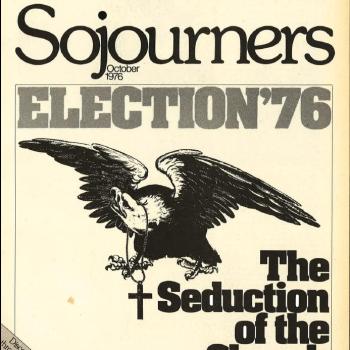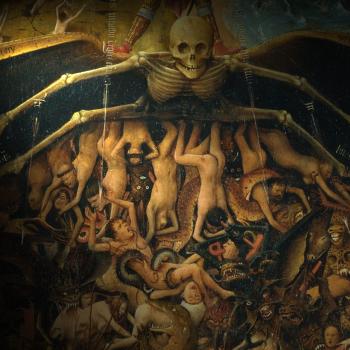Today we welcome to the Anxious Bench Anne Perez. Dr. Anne Perez is author of Understanding Zionism: History and Perspectives (Fortress Press, 2023). She received a PhD in History from the University of California, Davis in 2018 with a specialization in modern Israel and Jewish studies, and has a Masters of Theological Studies from Bethel Seminary San Diego (since closed by Bethel University, and largely reconstituted as Pacific Theological Seminary). She has lived, worked, and researched in Israel, Lebanon, and Scotland, and is now settled in Alabama.
It was October 7, 2024, and no one at my workplace seemed like there was anything particularly noteworthy about the day. It was surreal to me to be weighed down by the past year, by the loadedness of the date itself, by the fear and sadness and frustration of what it still means.
I am lucky and thankful to not have lost any loved ones on or since that day. I know some who have. And having lived in Lebanon for a couple years (2009–2011), I can only imagine the fresh horror my former friends and colleagues are experiencing. Still, October 7th is not a day of personal loss—not only did I not lose any loved ones; I am not Jewish, I am not Palestinian, I am not Lebanese. So it feels a little strange to have the day haunt me. But I felt like I had to mark the day somehow, and I took the opportunity to attend the yahrzeit service at one of the synagogues in our city.
I still felt restless when I got home, and I thought I should finally read some of the work by Hayim Katsman, a young Israeli scholar who was one of the victims killed by Hamas. I have seen colleagues sharing his work and their experiences working with him—particularly regarding his keen insights into the conflicts that steeped his society and his consistent opposition to the Israeli control of Palestinian territories and population. His family, instead of demanding retribution for his life, has spoken out how he never would have wanted his death to serve as any justification for deaths of others. Katsman’s scholarly work focused on religious Zionists and extremism in Israel; my own research has been on the intersections of religion and nationalism in the Zionist movement and early state of Israel, albeit from a different vantage point than Religious Zionism (though this was certainly in the orbit of my inquiries). So I expected to be interested in what Katsman had to say, and that I would not just be reading as an exercise of honoring his memory. What I didn’t expect is how much his work would speak to ongoing questions and concerns in my own faith context and community.
Katsman’s 2020 article, “The Hyphen Cannot Hold: Contemporary Trends in Religious Zionism”, offers a new approach for understanding this category. His work insists that prevailing narratives and categorizations of religious Zionism are no longer relevant to contemporary realities, particularly since the 2005 Israeli “Disengagement” in Gaza. Instead of understanding religious Zionists from an ideological (or theological) perspective—the contents and foundations of their beliefs—it could be more fruitful to understand them from a sociological perspective—the circles in which they move and the tangible goals that they pursue. Understanding religious Zionism as a sociological category instead of a religious one unlocks more analytical potential, because it is not a “synthesis between religion and Zionism”, but it is primarily a set of “social connections (kinship, geographical, institutional) between the members of the group.”
Katsman posits that Religious Zionists themselves no longer share theological interpretations or priorities; “features once considered to characterize the movement in certain periods—such as pragmatism versus messianism (Ravitzky 1996; Schwarz 1999), settlement of the land (Schwarz 1997), democracy (Geiger 2016; Kaye 2013; Schwarz 2018), and, most importantly, the status and authority of the Israeli state (Hellinger et al. 2018; Roth 2014)—are constantly contested and debated among Religious-Zionists.” Given the diversity of theological, practical, and political opinions among those self-identifying as religious Zionists, the attempt to create an ideological summary of this group could be a futile task. Instead, Katsman identifies a sociological category that hinges primarily on upbringing in the publicly-funded religious school system in Israel. He identifies some of the most divisive and diverging issues under the umbrella of this sociological group: sources of political or spiritual authority (whether this is the Israeli state, the land, rabbinical proclamations, or some combination), the rise of Orthodox feminism and awareness of sexual abuse in religious communities, and shifting inclinations towards a capitalist economy and away from older socialist Zionist influences. “The most striking fact about contemporary Religious-Zionism,” Katsman ventures, “is that one can be both religious/Orthodox and a Zionist and still not be considered part of this social group….On the other hand, you may not have to be either religious or Zionist to be considered part of the Religious-Zionist camp.” In other words, not all Religious Zionists are religious Zionists.
Katsman located the early 21st century as an analytical turning point for Religious Zionism, at which ideological or theological explanations that work in a context fifty or a hundred years prior could actually constrain and obfuscate its analysis (trying to put new wine into old wineskins, as it were). His article reminded me of how scholars of evangelicalism have been questioning the contours and contents of the category. I am not a scholar of American history or evangelicalism, but I am a historian of religion and, for better or worse, some kind of evangelical myself. Regular readers of this blog will commiserate with the system of ideological and existential knots this creates. Who are the “real” evangelicals, the Moral Majority or the Moral Minority? Perhaps Katsman’s sociological framework might better explain how it is that I share the name of a faith with those who also hold social and political orientations that this same faith has led me to consider reprehensible? More developed sociological models (some of which have already been under construction by authors of this blog) may better explain whether and why American Christians have in fact been undergoing a demonstrably new era, identify its key inflection points are, and if we’re lucky, even inform how to navigate personal and collective expressions of this faith.
I wish I could see Katsman at a future conference and ask him if he thinks there’s any salience in this comparison between his sociological model of Religious Zionism and sociological models for evangelicalism. More than this, I wish he had never been murdered by Hamas, and that his family did not have to have their lives forever changed by this tragedy. I wish the invasion in Gaza that Katsman almost certainly would have opposed had never taken place, and would stop immediately. I wish the Israeli hostages there will go home. I wish Lebanon would be left alone, would not be undergoing yet another Israeli invasion, and would not continue to be politically handicapped by the imperialism of Iran and Syria. Part of the very little that I can do is what I’ve been trained to do—think about and write about history. For myself and any other scholar of religion and nationalism, we clearly have our work cut out for us.













